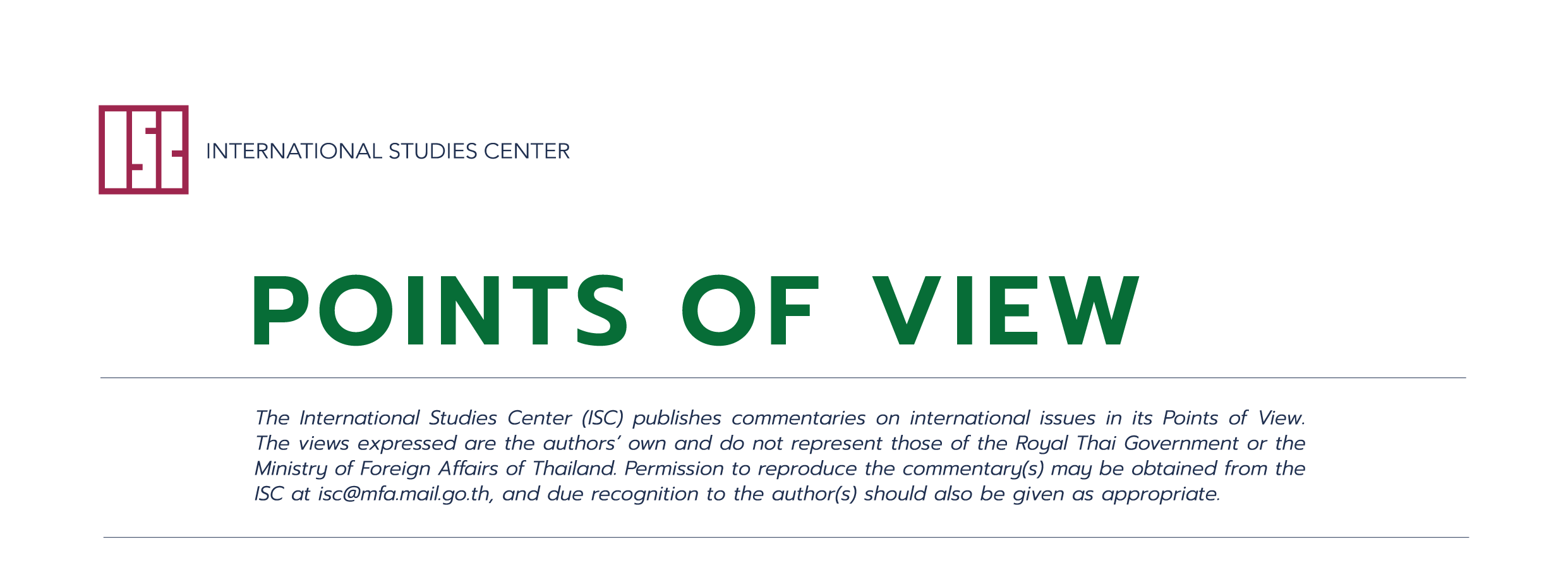Thailand Strives to Become a Vaccine Sustainable Country | Kavi Chongkittavorn
Thailand Strives to Become a Vaccine Sustainable Country | Kavi Chongkittavorn
วันที่นำเข้าข้อมูล 22 Jun 2021
วันที่ปรับปรุงข้อมูล 14 Dec 2022
 |
No. 2/2021 | June 2021
Thailand Strives to Become a Vaccine Sustainable Country
Kavi Chongkittavorn*
(Download .pdf below)
In recent weeks, several news headlines have dominated regional media related to Thailand’s ability to deliver the vaccines it is producing to recipient countries in Asia. For decades, Thailand has been at the forefront of the war against contagious diseases. Its public health measures and security are one of the region’s best. With the current pandemic, the country aspires to be a developing country with strong vaccination security in the region.
Thailand’s Siam Bioscience, which is one of 25 companies around the world given a license to produce AstraZeneca for the export and local markets, is working day and night to meet both foreign demands and those at home. Since last December, the company has been producing several millions of vaccines for export to Asian countries.
However, last week, Thailand-Taiwan relations were put to the test when reports emerged that President Tsai Ing-Wen was criticizing the country for “giving priority to vaccines to be used in Thailand.” Her comments created a public uproar, as Thailand is now struggling to vaccinate its entire population by the end of this year. The Taiwanese president’s views drew a strong reaction from the Thai government, Deputy Government Spokesperson Traisuree Taisaranakul said on Twitter that Thailand is not blocking exports of AstraZeneca. “It is a matter for the producer to manage,” she said without elaborating. Later on, the Taipei Economic and Cultural Office in Thailand denied the reports which went viral on the social media.
Earlier, the Philippines added that it was expecting late deliveries of AstraZeneca’s Thai-made vaccines due to production delays. In addition, Malaysia also expressed concern at the expected delay in its deliveries. These comments have raised doubts whether Thailand can become a self-sufficient in the vaccine security. Today, the distribution plans of AstraZeneca in ASEAN depend on 200 million doses made by Siam Bioscience. As the only country in Southeast Asia that can produce vaccines at this critical juncture, Thailand’s vaccine security in under close scrutiny. This long-standing ability was attributed to the late King Bhumibol Adulyadej, who invested heavily for many decades to help the country become self-sufficient in producing vaccines against various tropical diseases.
From the first quarter of this year, time-tables for producing vaccines were severely disrupted by the continued spike of infections in urban clusters centred around marketplaces, factories and construction sites. In an earlier plan, it was envisaged that by December, Thailand would be able to produce nearly 100 million doses for domestic use and for export. New upticks beginning April saw the demand for vaccines increase dramatically. Amid growing public criticism, the Ministry of Public Health has looked for alternative vaccines from the US, UK and Russia.
A massive inoculation campaign, which started countrywide during the first week of June, was a new milestone in the war against the pandemic. As of June 16, a total of 6.19 million shots had been administered or almost 10 per cent of the population. According to Dr. Opas Karnkawinpong, head of the Department of Disease Control, 17 per cent of Bangkokians have had their first jab. They include education personnel, public transport workers and subscribers to the social security fund. It is hoped that by the end of December, at least 70 per cent of Thai population will have received their shots.
Besides the AstraZeneca vaccine produced in Thailand, local scientists at various laboratories and universities are also experimenting with various types of vaccines including those which use local herbal and ingredients. The most notable has been Chulalongkorn University’s mRNA COVID-19 vaccine, known as ChulaCov19, which has already begun Phase 1 of human trials with 72 volunteers last week. After June, a larger number of volunteers up to 5,000 could be involved in Phase 2 and even more in the final Phase 3. It all goes as planned, ChulaCov19 could be manufactured in Thailand by the end of this year. The Thai vaccine is similar to the Pfizer and Moderna vaccines that use messenger RNA or mRNA to teach our cells how to make a protein that triggers an immune-response against the coronavirus in our bodies.
It is an open secret that during the third quarter of 2020, senior officials at the Government House and Ministry of Foreign Affairs had discussed how Thailand could assist neighbouring countries with vaccines and other public health-related programmes in the future. However, due to the surge of infections during the second quarter and delayed mass inoculation, the vaccine diplomacy has been temporarily shelved. Notably, each ASEAN member has its own preferences for vaccines, depending on local demands and brand trust. All major brands available now are being administrated in all member countries. The most popular ones have been AstraZeneca and Sinovac. Given the overall pandemic situation, all members will need additional vaccines to achieve regional herd community.
Within the ASEAN context, Thailand has played an active in various policy formulations and implementation to fight against the pandemic and work for speedier economic recovery. Bangkok initiated the ASEAN COVID-19 Response Fund, which has now accumulated a total of US$13 million dollars. Recently, ASEAN agreed to use part of this fund to procure vaccines from the COVAX program administrated by the World Health Organization.
Continued massive vaccination and effective mitigation of COVID-19 will remain the pivotal keys to strengthen Thailand’s self-reliance on vaccine security. This noble objective will remain elusive if some quarters of the region and the world still do not have much needed inoculation. The country’s challenge ahead is to learn from the acute pandemics experience so that it can be a self-reliance nation on vaccine security.
[*] A veteran journalist on regional affairs